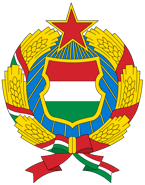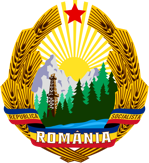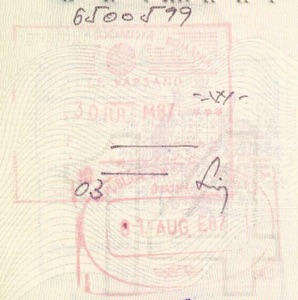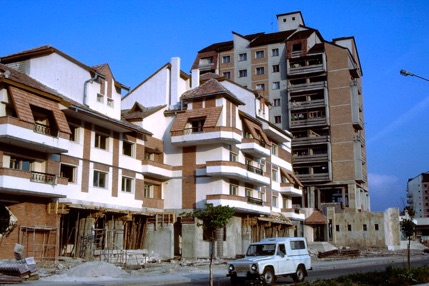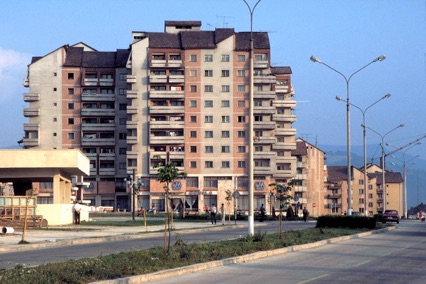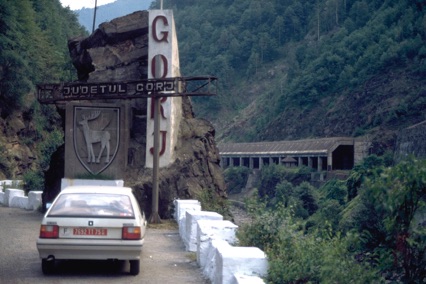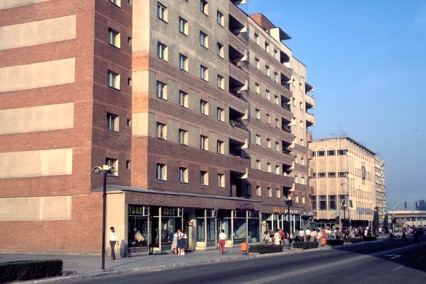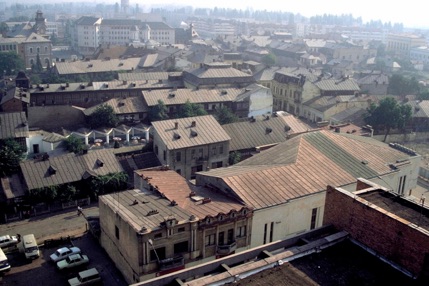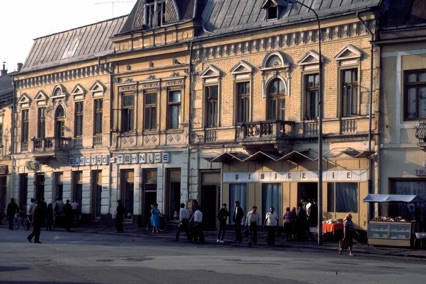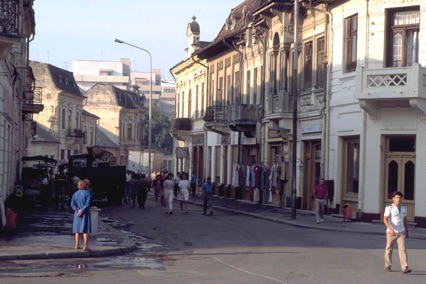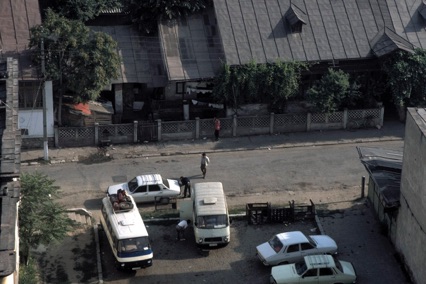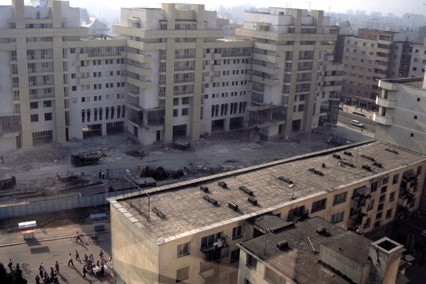Europe 1987

Kyrgyzstan and Tajikistan 2018

Gyula is situated right on the border with Romania, the next country in our itinerary. Whereas Hungary is one of the most liberal and easy-going Communist countries, Romania is one of the harshest (even stricter than Czechoslovakia) and most isolated. Romania had been an ally of Nazi Germany during World War II, which may explain why it was treated somewhat more harshly by the Soviet Red Army after it drove out the Germans in 1944.
In the immediate post-war period, Romania was a loyal Soviet satellite, but after Khrushchev’s denunciations of Stalin in 1956, Romania began to drift away from the USSR, leaving the Warsaw Pact and forging closer links with non-aligned Communist countries such as Yugoslavia, China and North Korea. The drift away from Soviet influence accelerated after Nicolae Ceauşescu became the country’s leader in 1965.
By the time of our visit, we knew that Romania had become a very strange place. Since his elevation to the presidency, Ceauşescu had created something of a personality cult around himself, and as time progressed further, this expanded to include his wife, Elena, who became a more and more powerful political force in her own right.
In the 1960s, the government issued Decree 770 to halt a declining birth rate, prohibiting contraception and abortions. Romanian women had to undergo compulsory monthly examinations by state doctors (known as the “menstrual police”). Pregnancies were recorded and supervised through to birth, while women who had a miscarriage were investigated for having had a suspected abortion. Women who failed to conceive were interrogated about their personal life and sexual habits. It was commonly said that half the population were part-time informers to the Securitate (secret police), the other half of the population being considered full-time.
We had travelled to Gyula specifically because we had heard that border crossings into Romania can be among the slowest, most time consuming and most difficult of all Eastern European borders, but the crossing at Gyula is always less busy than the others, and therefore a bit easier and faster.
We set off from our accommodation at 9:00am, and we reached the border in less than ten minutes. Exiting through Hungarian Immigration was quick and painless, and having done so, we drove towards the Romanian Immigration post on the other side of the frontier. It was reassuring to see just two cars ahead of us, one of which was a small van and the other a tiny Polski Fiat 126 with Polish number plates. Processing the small van took about half an hour, and as we stood and waited our turn, it became obvious that the border officials were determined to be very thorough with the Polish car – we learned later that in Hungary and Romania the Poles have the reputation of being “the smugglers of Europe”. That might explain why the border guards not only searched everywhere inside the little car, but removed the lining from the doors and even the cylinder head from the car’s engine.
After an hour and a half standing waiting, the little Fiat was finally allowed to proceed and it was our turn. Our inspection was a little less thorough than the previous car – everything had to be emptied out of the boot, but our suitcases were only half-examined. Most interest was shown in written material, such as guidebooks and some letters we had received via Poste Restante in Prague, which were opened and read.
Time dragged on, and after an hour I was starting to worry that we might not have time to reach our destination, the city of Tirju Jiu, which was about 400 kilometres away with an estimated driving time of about six hours. Under Romanian law, foreigners are not permitted to be out driving after sunset.
Di was carrying Tim at that time, and whispered to me “we’ll give her (the border guard) ten more minutes, and if she hasn’t finished, I’ll stick the nappy pin into Tim’s bottom to make him cry; that should speed things up”. Ten minutes passed, the border guard was still looking through our belongings, so Di kept her promise. Tim responded immediately (as predicted) by letting out a yell and starting to cry. It had the desired effect; the border guard said “oh, the poor baby must be getting tired, I think that is enough now”. And so we set off into Romania, with the door lining and engine block of our car still intact.
As soon as we had crossed the border, it was obvious we were in a very different country. The condition of the road was noticeably worse than in Hungary (where the roads were quite well maintained), with large potholes that required diversionary driving to avoid. Perhaps the most alarming thing of all, though, was that every so often, small groups of children would run out onto the road ahead of us, stand on the roadway, and gesture to beg for food.
The first large city we came to was Arad at about midday. Liesl became quite scared every time we stopped at intersections as women would walk up right to the side window of the car, tap on the glass beside her, press their faces near the window to peer into car and make begging gestures. It’s something that our six year old daughter had never experienced; she found it quite confronting and was understandably frightened, pleading with me not to stop at the congested intersections.
Arad was also the place where we had to exchange hard currency for the coupons needed to pay for our hotel and to buy petrol. We were quite nervous when we were told that the office would be closed until 3:00pm, but thankfully that turned out not to be so. Nonetheless, it took a huge effort to wade through the bureaucracy, complete the necessary registrations and obtain the coupons – two hours in fact.
We finally managed to get on our way at 4:00pm (losing an hour due to the time difference from Hungary). We continued our drive to the south, by-passing the centre of Timişoara, and continuing through Haeg, Pui and Petroşani. By far the prettiest part of the trip was the next section of the drive, the slow drive through the winding roads that followed deep narrow Judetul Gorge through the Carpathian Mountains.
We finally arrived at our hotel, the Hotel Gorj in Tirju Jiu at 8:30pm, just as dusk was falling (sunset was just before 9:00pm). Like Czechoslovakia, Romania has no links with Youth Hostels, so we had to use economy hotels instead. The Hotel Gorj looked okay in brochures we had seen, but with no staff speaking English, I had to rely on my schoolboy French, which although rusty, rapidly became more proficient as I had to rely on it for all communication.
We were given a room one floor above ground level, but the floor was disgustingly filthy, and certainly unsuitable for a baby to be crawling around. So, drawing upon my limited French, I went down to the reception desk and explained “le plancher est si sale qu'on peut cultiver des pommes de terre dans le tapis” (transl. “the floor is so dirty that one could grow potatoes in the carpet”). I remember thinking that the sentences I had learned in French classes at school weren’t really the practical expressions needed when travelling in Romania, but it seemed to work; we were reallocated a room on an upper floor that was much cleaner, and had a view from the window as an additional bonus.
We had a very late dinner from an extremely limited menu, enduring several power blackouts during the course of the meal. Unfortunately, Di developed a bout of nausea and diarrohea after the meal which we attributed to the water not being boiled properly before being used to make her cup of black tea, perhaps due to the power cuts.

Day 18
Gyula to Tirgu Jiu
Thursday 30 July 1987
